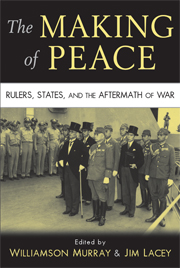Book contents
- Frontmatter
- Contents
- Preface: concluding peace
- 1 Introduction: searching for peace
- 2 The Peace of Nicias
- 3 “A swift and sure peace”: the Congress of Westphalia 1643–1648
- 4 The Peace of Paris, 1763
- 5 In search of military repose: the Congress of Vienna and the making of peace
- 6 War and peace in the post–Civil War South
- 7 Vae victoribus: Bismarck's quest for peace in the Franco-Prussian War, 1870–1871
- 8 Versailles: the peace without a chance
- 9 “Building buffers and filling vacuums”: Great Britain and the Middle East, 1914–1922
- 10 Mission improbable, fear, culture, and interest: peace making, 1943–1949
- 11 The economic making of peace
- 12 Ending the Cold War
- 13 Conclusion: history and the making of peace
- Index
- References
3 - “A swift and sure peace”: the Congress of Westphalia 1643–1648
Published online by Cambridge University Press: 05 June 2012
- Frontmatter
- Contents
- Preface: concluding peace
- 1 Introduction: searching for peace
- 2 The Peace of Nicias
- 3 “A swift and sure peace”: the Congress of Westphalia 1643–1648
- 4 The Peace of Paris, 1763
- 5 In search of military repose: the Congress of Vienna and the making of peace
- 6 War and peace in the post–Civil War South
- 7 Vae victoribus: Bismarck's quest for peace in the Franco-Prussian War, 1870–1871
- 8 Versailles: the peace without a chance
- 9 “Building buffers and filling vacuums”: Great Britain and the Middle East, 1914–1922
- 10 Mission improbable, fear, culture, and interest: peace making, 1943–1949
- 11 The economic making of peace
- 12 Ending the Cold War
- 13 Conclusion: history and the making of peace
- Index
- References
Summary
The Congress of Westphalia began just like medieval peace conferences. First of all, it was initiated by the pope, Urban VIII (1623–1644), who saw it as his responsibility to end the shedding of Christian blood. Since 1634, he had repeatedly urged France, Spain, and the Holy Roman Empire to resolve their differences in a conference mediated by a papal nuncio. Like his predecessors, Pope Urban also feared that the Thirty Years' War (1618–1648) would allow the Ottoman Turks to seize Christian territory. In fact, the Ottomans did invade the Venetian-held island of Crete in 1645 and, thus, initiated a war that lasted twenty-four years and delivered the island to Ottoman control until 1898. Both before and during the Congress of Westphalia, the idea of uniting the Christian powers and launching a new crusade against the Ottomans ran just beneath the surface. France was well aware of the Ottoman threat. For many years, the Capuchin Father Joseph, the guiding force behind France's chief minister, Cardinal Richelieu, saw a crusade against Islam as the ultimate goal of French foreign policy. Only later did he and his master change their minds: France alternately sought to provoke an Ottoman attack in the Balkans in order to force the Habsburgs to concede French terms, and offered the Habsburgs military assistance against the Ottomans in order to make their demands seem more palatable.
- Type
- Chapter
- Information
- The Making of PeaceRulers, States, and the Aftermath of War, pp. 70 - 99Publisher: Cambridge University PressPrint publication year: 2008
References
- 1
- Cited by



